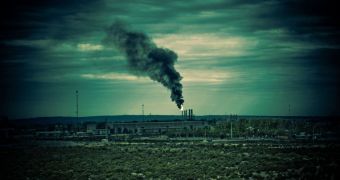Compared to the 1990s, this decade has seen an accelerated rise in carbon dioxide (CO2) levels globally, a group of researchers announces. In spite of increased awareness and some efforts of mitigating their effects, greenhouse gases, which have been tied to global warming, have increased their annual rate by more than 300 percent in the last 10 years. That is equivalent to tripling the speed with which our atmosphere and oceans are becoming saturated with the chemicals. Largely to blame are oil companies, fossil fuel power plants, and average individuals who still believe propaganda being poured on them by various groups of interests.
The latter group is the same that clings to every flimsy study which tells them they are too small to cause global warming. This has been made obvious in the comments section of this site or other across the Web, that wrote about the issues of global warming. The ignorance that these individuals display leads them to live a happy life, but dooms the rest of us, who actually have a conscience, to living a life under constant threats of extreme temperatures and floods, among disrupted natural cycles and other such things. Unless “CO2 emissions [are] drastically reduced,” the future of Earth is bleak, the group of researchers wrote in a document accompanying their study.
“Over the last decade, CO2 emissions have continued to climb despite efforts to control emissions. Preliminary evidence suggests that the land and ocean may be becoming less effective at removing CO2 from the atmosphere, which could accelerate future climate change,” explains Woods Hole Oceanographic Institution (WHOI) senior scientist Scott C. Doney, who was an active part of the new study. Since 2000, global CO2 emissions have increased by 29 percent. If this trend goes on, it's easy to see (if you're willing to) that the future of the planet is at risk. Human activities can indeed have a very powerful impact on the environment, as evidenced by the new readings.
“Although the emissions of CO2 from deforestation accounted for only about 15 percent of total CO2 emissions over the period 2000-2008, reducing deforestation is one of the activities that could contribute significantly to stabilizing the concentration of CO2 in the atmosphere,” adds Woods Hole Research Center (WHRC) senior scientist and acting director Richard A. Houghton, who also participated in the research. This December will most likely see the issue of deforestation being discussed at the UN Climate Summit, to be held in Copenhagen, Denmark.
WHOI and WHRC, along with the Marine Biological Laboratory, make up the Woods Hole Consortium, an alliance that focuses on the interlocking issues of climate change and ecosystems health and human well-being. Details of the experts' work appear in the current issue of the respected journal Nature Geoscience.

 14 DAY TRIAL //
14 DAY TRIAL //